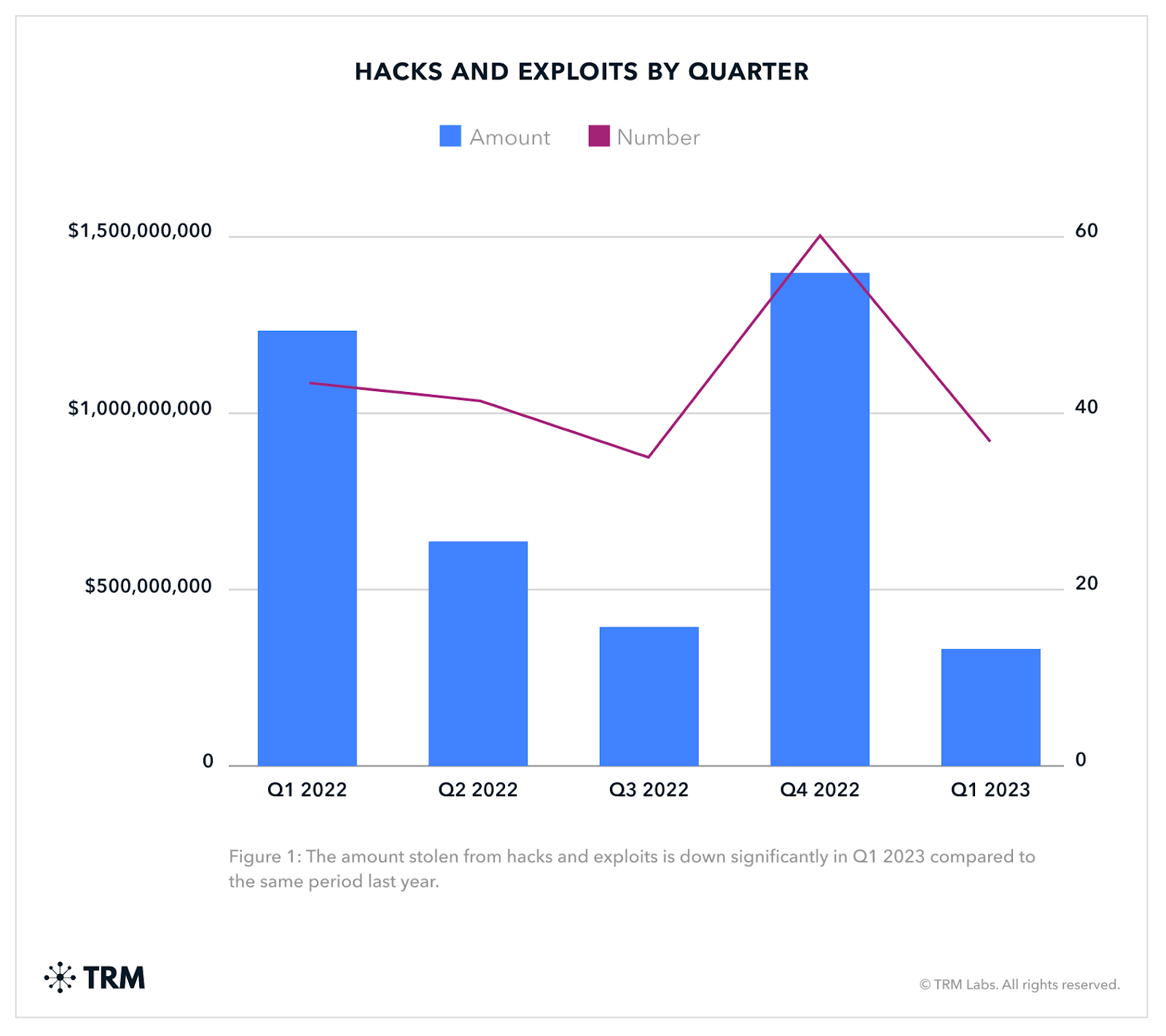Tornado Cash Sanctions Key to Drop in Crypto Hacks Last Quarter: TRM Labs

It’s been a bearish quarter for crypto hackers, a new report shows.
Blockchain intelligence firm TRM Labs revealed that the industry saw a dramatic drop in the number of hacks in the first quarter of 2023 due to recovery efforts and sanctions placed on the Ethereum mixer Tornado Cash.
The report states that hackers stole approximately $400 million from crypto projects across 40 attacks, representing a 70% decrease in money stolen compared to the same period in 2022.
Meet the Sleuthing Firm Helping DeFi Projects Stay Compliant With Tornado Cash Sanctions
While the number of hacking incidents held steady quarter-over-quarter, the average size of each hack dropped from $30 million to $10.5 million.
Moreover, the amount stolen through hacks in Q1 2023 was less than in any quarter in 2022.

Source: TRM Labs.
The report attributed the industry’s positive trend to legal actions against hackers and last year’s sanctions on Tornado Cash which made it «difficult to launder the proceeds.»
Mango Markets arrest a turning point, says TRM Labs
Regulators cracking down on attackers may have also played a role in the decrease in hacks this past quarter.
In December 2022, the U.S. Department of Justice arrested Avraham Eisenberg, charging him with market manipulation related to his $114 million on Solana’s decentralized perpetual exchange, Mango Markets, even though he had returned $67 million from the stolen amount.
Analysts from TRM Labs added that «Avraham’s prosecution may have signaled to would-be attackers that even an agreement from the victim not to pursue legal action may not confer protection.»
Another factor that influenced low hacking amounts in Q1 2023 was the rise in attackers returning their ill-gotten funds.
In April 2023, for example, Euler Finance exploiter returned funds from its $200 million hack. Similarly, a Tender.fi exploiter, who stole $1.5 million, settled for an $850,000 bug bounty with the team.
Biggest Crypto Exploits and Hacks of 2022
The report also cited implementations of «anti-money laundering standards» by exchanges, legal actions against «bad actors,» and sophisticated «blockchain intelligence tools» as reasons for the drop in attacks.
Still, analysts estimate that crypto hacks will likely «rebound» as the year progresses. This is due to the fact that just a few large hacks can quickly skew the numbers. TRM analysts found that ten hacks accounted for 75% of the total hacked amount in 2022.
Thus, individual quarters offer «poor predictions» of yearly projections, the report read.






 Bitcoin
Bitcoin  Ethereum
Ethereum  Tether
Tether  USDC
USDC  TRON
TRON  Dogecoin
Dogecoin  Cardano
Cardano  Monero
Monero  Bitcoin Cash
Bitcoin Cash  Chainlink
Chainlink  LEO Token
LEO Token  Stellar
Stellar  Zcash
Zcash  Litecoin
Litecoin  Hedera
Hedera  Dai
Dai  Cronos
Cronos  OKB
OKB  Tether Gold
Tether Gold  Ethereum Classic
Ethereum Classic  KuCoin
KuCoin  Cosmos Hub
Cosmos Hub  Gate
Gate  Algorand
Algorand  VeChain
VeChain  Dash
Dash  Stacks
Stacks  Tezos
Tezos  TrueUSD
TrueUSD  IOTA
IOTA  Decred
Decred  Theta Network
Theta Network  Basic Attention
Basic Attention  NEO
NEO  Synthetix
Synthetix  Qtum
Qtum  Ravencoin
Ravencoin  0x Protocol
0x Protocol  DigiByte
DigiByte  Zilliqa
Zilliqa  Nano
Nano  Siacoin
Siacoin  Numeraire
Numeraire  Waves
Waves  Ontology
Ontology  Enjin Coin
Enjin Coin  Status
Status  BUSD
BUSD  Hive
Hive  Pax Dollar
Pax Dollar  Lisk
Lisk  Steem
Steem  Huobi
Huobi  OMG Network
OMG Network  Bitcoin Gold
Bitcoin Gold  NEM
NEM  Augur
Augur  Bitcoin Diamond
Bitcoin Diamond